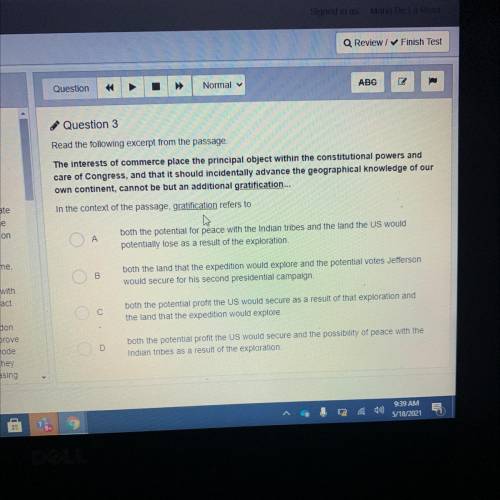
English, 18.05.2021 19:50, naomicervero
What
Question 3
Read the following excerpt from the passage,
The interests of commerce place the principal object within the constitutional powers and
care of Congress, and that it should incidentally advance the geographical knowledge of our
own continent, cannot be but an additional gratification ...
Il be
municate
on the
shall, on
In the context of the passage, gratification refers to
ОА
both the potential for peace with the Indian tribes and the land the US would
potentially lose as a result of the exploration
B
both the land that the expedition would explore and the potential votes Jefferson
would secure for his second presidential campaign
С
ble time,
py
ngth with
unteract
ur
abandon
eby prove
er mode
and they
creasing
both the potential profit the US would secure as a result of that exploration and
the land that the expedition would explore.
D
both the potential profit the US would secure and the possibility of peace with the
Indian tribes as a result of the exploration


Answers: 3
Other questions on the subject: English

English, 21.06.2019 18:30, Wolfzbayne
Which three events took place when lincoln lived at knob creek farm?
Answers: 3

English, 21.06.2019 23:30, garciagang0630
With this 3 questions ! really need them right! 1. the first continental congress met in philadelphia on september 5, 1774. all of the colonies sent representatives except georgia. this congress continued in session until october 26, 1774. by then it had passed resolutions calling for a boycott against british trade. the author's main purpose was a. to inform b. to persuade c. to instruct d. to give an opinion 2. identify the point of view of each of the following passages. "my second mate was a round-cheeked, silent young man, grave beyond his years, i thought; but as our eyes happened to meet i detected a slight quiver on his lips. i looked down at once. it was not my part to encourage sneering on board my ship. it must be said, too, that i knew very little of my officers." (joseph conrad, "the secret sharer") a. first person b. third person limited c. third person omniscient d. none of the above 3. identify the point of view of each of the following passages. "he had only himself to in his choice: his fortune was his own; for as to frank, it was more than being tacitly brought up as his uncle's heir, it had become so avowed an adoption as to have him assume the name of churchill on coming of age. it was most unlikely, therefore, that he should ever want his father's assistance. his father had no apprehension of it." (jane austen, emma) a. third person omniscient b. third person limited c. first person d. none of the above
Answers: 1

English, 22.06.2019 01:00, nimahmustafa
Will give if correct read the passage first of all, if someone says your dream is impossible, they’re wrong. you can’t prove that something is impossible-all you know is that [it] hasn’t been done yet. people said no one could scale mount everest, but in 1953, sir edmund hilary and tenzing norgay gazed down upon the world from its summit. people said that man could not fly, but in 1903, orville and wilbur wright made the first sustained powered flight in a heavier-than-air machine. people said, “okay, we admit that someone could climb mount everest, and we admit that man has learned to fly, but no one will ever, ever walk on the face of the moon.” if we can send three men a quarter of a million miles away and bring them home safely, is there any great task we cannot accomplish? which identifies the textual evidence that best supports the claim: the authors purpose is to persuade? a: the author shares historical information about the wright brothers. b: the author states that men have walked the moon. c: the author states that others who think your dreams are impossible are wrong. d: the author wants to know what tasks we cannot accomplish.
Answers: 2

English, 22.06.2019 07:00, kitttimothy55
The literature of nineteenth-century realism depicted everyday life in a realistic way. which statements show that leo tolstoy’s the death of ivan ilyich is a realist text? the description of human struggles in the form of ivan ilyich’s suffering the faithfulness of relationships that ivan ilyich experiences toward the end of his life the romantic tension that occurs between ivan ilyich and his wife the difference between superficial and authentic living the plot ending with a surprising turn of events
Answers: 3
Do you know the correct answer?
What
Question 3
Read the following excerpt from the passage,
The interests of commerce...
Read the following excerpt from the passage,
The interests of commerce...
Questions in other subjects:

Mathematics, 05.02.2021 04:30

Mathematics, 05.02.2021 04:30

Chemistry, 05.02.2021 04:30

English, 05.02.2021 04:30

English, 05.02.2021 04:30

Mathematics, 05.02.2021 04:30









